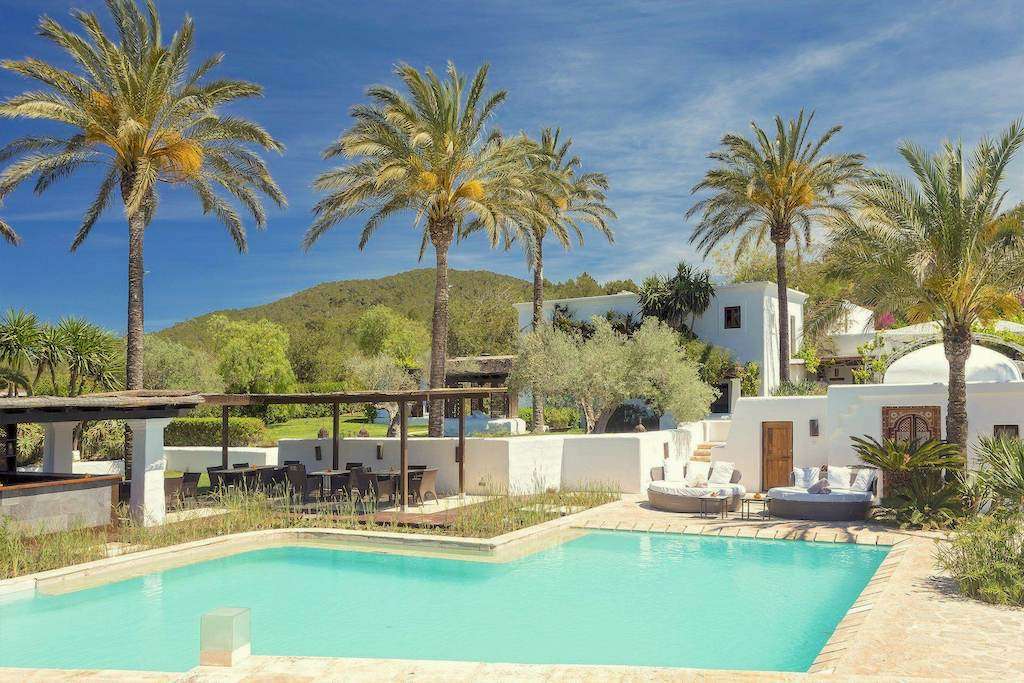Long known for its nightlife scene, Ibiza — the Mediterranean destination off of Spain’s eastern coast — is now becoming synonymous with wellness, sustainability, and conservation.
It was the rowdy, drunken 20-something of vacation destinations. Ibiza has long been the place to go for drinking, clubbing, and never-ending beach parties where all manner of depravity is the norm. But these days, the sunny island of Ibiza is undergoing an identity shift. It’s doing away with angling itself toward the drunk tourists who trash the island and is instead, promoting the region’s biodiversity through conservation efforts and wellness tourism.
Ibiza became a party destination following the hype that started in the 1960s as the place was believed to hold strong spiritual energy because of magnetic “ley lines” converging on the island. That led to its party reputation, and over the years, the parties on the island, particularly around spring break, only increased, becoming more excessive and extravagant.
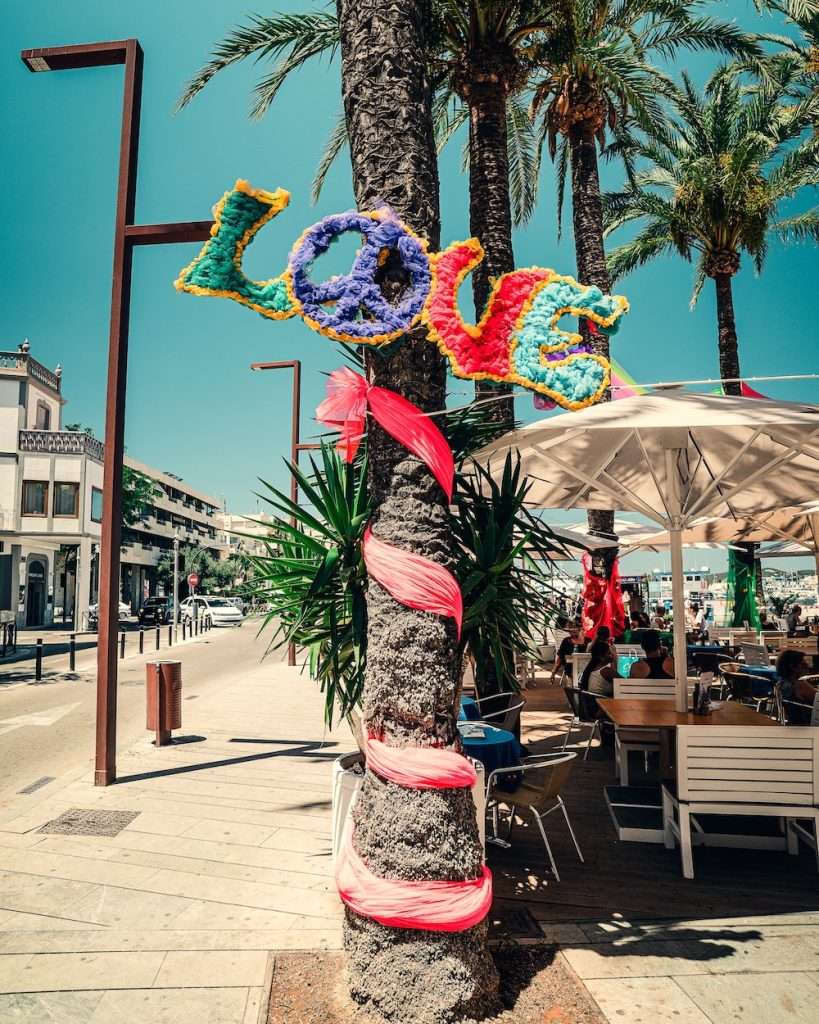
Despite its party reputation, Ibiza’s hippie roots have long remained on the island with health food stores, organic farms, and a number of healthy, plant-forward restaurants holding strong even amid the drop in tourists post-covid. Many of the island’s hotels are converted farmhouses or fincas, giving it that old-world charm with modern conveniences. But visitors now are much more subdued; renting houses and relaxing privately with friends and family has replaced the nonstop club life for a number of guests. Like most travel destinations, covid took a toll on Ibiza, with clubs shuttering, tourists waning, and nature reclaiming its rights.
Locals want to keep it that way.
The party’s over
A campaign launched in 2022 by the group Podemos (“We Can”) is urging Ibiza’s government to ban beach clubs and the island’s “hotel discos”. They say the clubs and nonstop partying are a nuisance for locals, with club music audible for miles. Podemos spokesman Fernando Gómez says the group aims to “end the legal limbo of one of the most important problems caused by tourism on the island of Ibiza, i.e. the serious inconvenience caused by the so-called beach clubs and hotel nightclubs.”
In early 2022, the local government approved laws that require businesses to prioritize sustainability measures. It earmarked €55 million to help with the implementation. The new laws will require increased efforts in recycling, as well as promoting sharing economies, waste reduction, and reducing pollution.
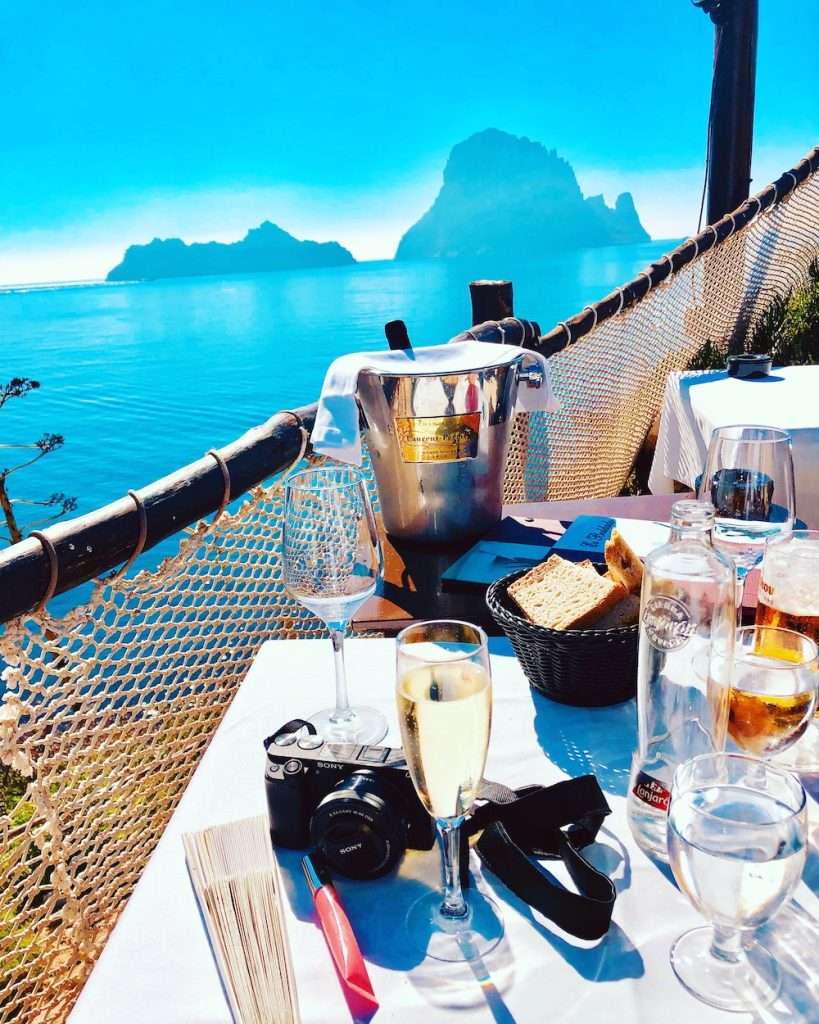
Since 2022, tourist-focused establishments across the island have had to measure water use. The island is mandating water-saving devices on sinks, tubs, and showers, and local businesses are encouraged to adopt rainwater catchments for use in operations where possible. Businesses will also have to replace oil heating with natural gas or electricity and control building temperatures. There are also crackdowns on single-use plastic and paper menus are being replaced by QR codes as well.
It’s not just the shift away from its party reputation that’s taking over the island. Ibiza is aiming to become a top spot for sustainable tourism like other top tourists destinations including Monaco, the Maldives, Greece, and Turkey, which are increasing their sustainability metrics by weaving it into the fabric of the rebounding tourism industries.
Other destinations, like the Pacific island nation of Palau, are making sustainability and mindfulness the gatekeepers to island activities. It recently launched a gamification element to “unlock” parts of the island for tourists who score points for sustainability metrics during their trip.
Ibiza’s shift
Destinations across Ibiza are adapting. In Cala Nova, located in Ibiza’s North-East, Atzaró Group beach club and restaurant Atzaró Beach is bringing sustainability into the destination. Atzaró is located on a 13-hectare estate of orange groves, tropical palms, Mediterranean gardens, and a three-hectare organic vegetable garden.
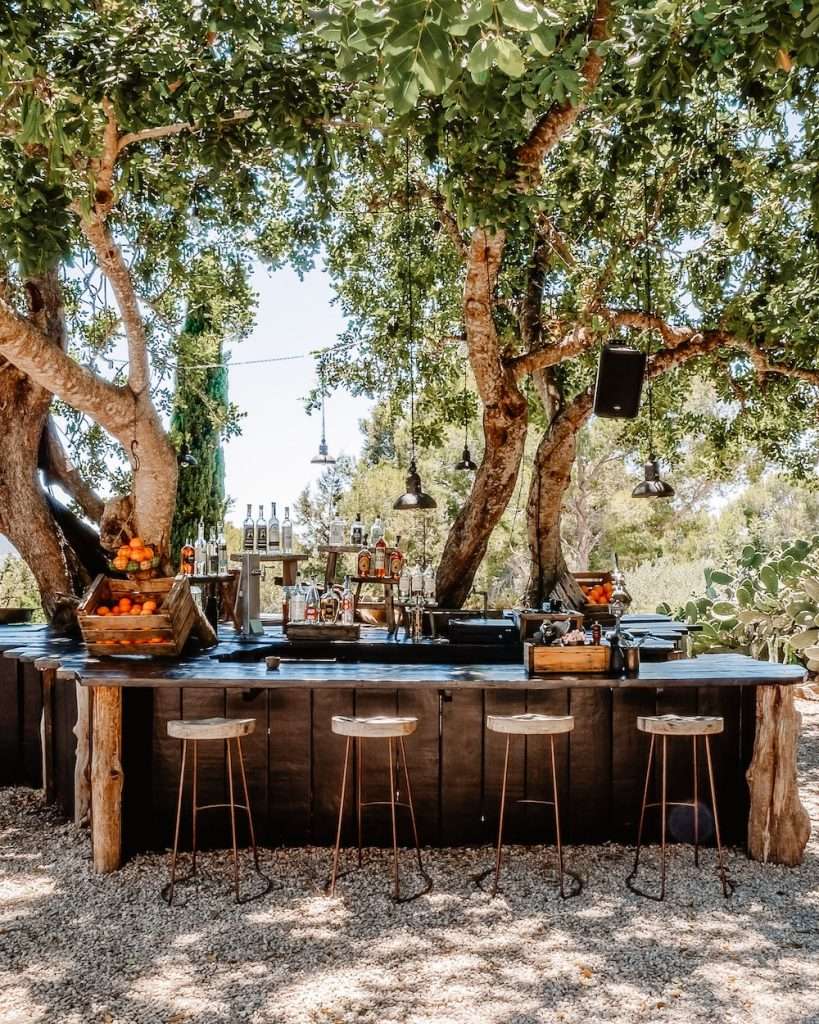
Atzaró is rooted in farming, originally a working orange farm, the hotel opened in 2004, coming to redefine sustainable luxury in the region. The destination’s signature pared-back style and design allows guests, which have included Rihanna, Kate Hudson, and the Fendi family, to immerse themselves in a 360-degree nature-connected sustainable hotel stay. This, the hotel says, is part of a unique luxury travel experience that puts guests “at one with nature.”
In 2019 the interiors and exteriors of Atzaró Beach were refurbished—a relaxed boho style conjures the ’70s island vibes. The remodel melds with the environment and combines natural woods, terracotta pots, and local plants, cacti, and palms.
The hotel is also embracing wellness with its spa garden that includes a jacuzzi deck amongst the orange trees, an outdoor fire-pit lounge for meditation and healing workshops, outdoor sauna pod, sunbathing decks and an additional daybed garden nestled in organic botanicals. The spa uses garden-grown lavender, rosemary, and other medicinal plants for its spa product range.
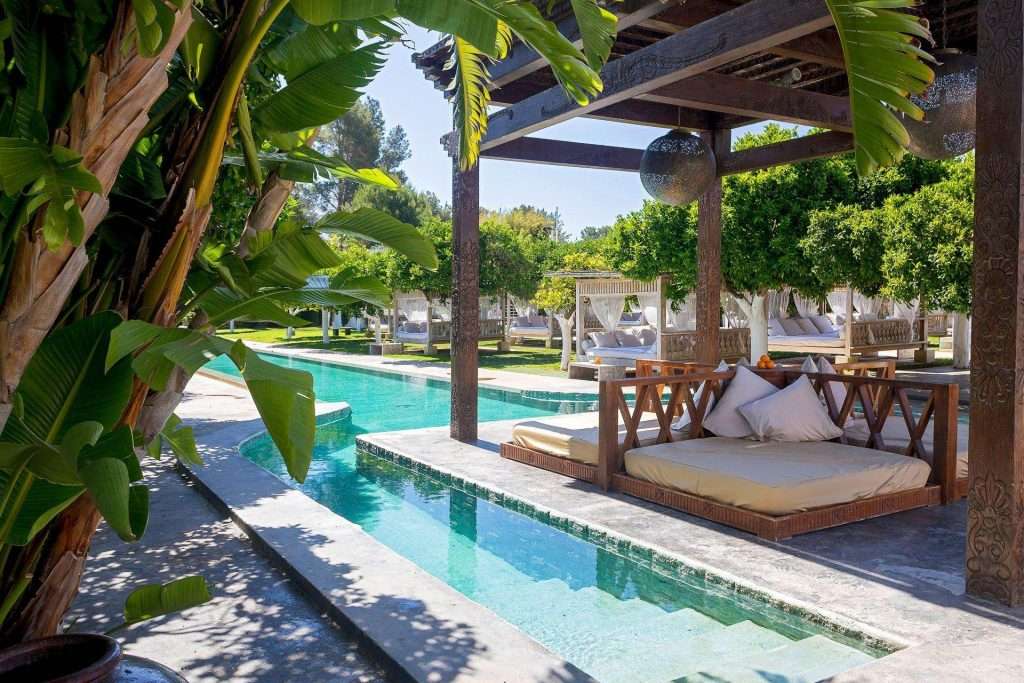
Top London chef James Adams has created a menu focused on locally grown produce some from the Atzaró Vegetable Garden — for a fresh, organic, and plant-forward menu. “I’m thrilled to be collaborating with Atzaró Group on the new food concepts,” Adams said in a statement. “The new food is all about abundance, organic ingredients, Atzaró farm-grown fresh produce, simplicity and taste — delicious farm-to-fork Mediterranean dishes made with healthy and natural ingredients grown right here in the estate’s vegetable garden — Atzaró on a plate.”
Last May, the Ibiza World Triathlon Multisport Championships became the first European event to attain Zero Waste certification. “For us, this is fantastic news. One of the priorities of World Triathlon, especially when it comes to events, is to contribute to leaving a better planet with the least possible environmental impact. I believe that the tremendous effort made for the Ibiza Multisport World Championship deserves this recognition. Many of the measures we implemented there should be incorporated into all our events to ensure that we can continue celebrating triathlons in such wonderful places like Ibiza,” explained Marisol Casado, President of World Triathlon and IOC member.
“We are very proud and excited to announce the Zero Waste certification of the World Triathlon Multisport Championships that took place in Ibiza in early 2023. Addressing waste reduction challenges and redefining purchasing policies, this event stands as a role model in circularity. Being the first of its kind, we hope to inspire future events towards a more sustainable and Zero Waste future in sports,” said Solène Fargeix, Business Development Director of the ‘Mission Zero Academy.’
Six Senses Cala Xarraca
In 2022, Six Senses, which operates more than 20 sustainably focused luxury hotels around the world, announced eight new local projects it’s supporting through its Cala Xarraca property in Ibiza. That’s in addition to the three it launched when it opened in 2021.
Six Senses says its Sustainability Fund is focusing on education and plastic waste with its local partners. Efforts include reducing and recycling plastic waste, with special attention to the region’s beaches. It’s also working to protect local wildlife including pollinators and hedgehogs. It’s also developing an app for guests to learn about the local, small, sustainable farmers. Education for locals includes a center for natural sciences for the island’s children to learn about ways they can protect the marine environment.
“The Sustainability Fund is designed with our community’s welfare in mind,” Six Senses Regional Director of Sustainability, Marta Cardoso, said in a statement. “We were surprised to discover all the projects focused on caring for the environment and the wholehearted commitment of people living on the island who have expressed an interest in taking part in the fund’s work. These projects perfectly match our mission, which is to support sustainable development in our local community, whether it’s environmental or social”.
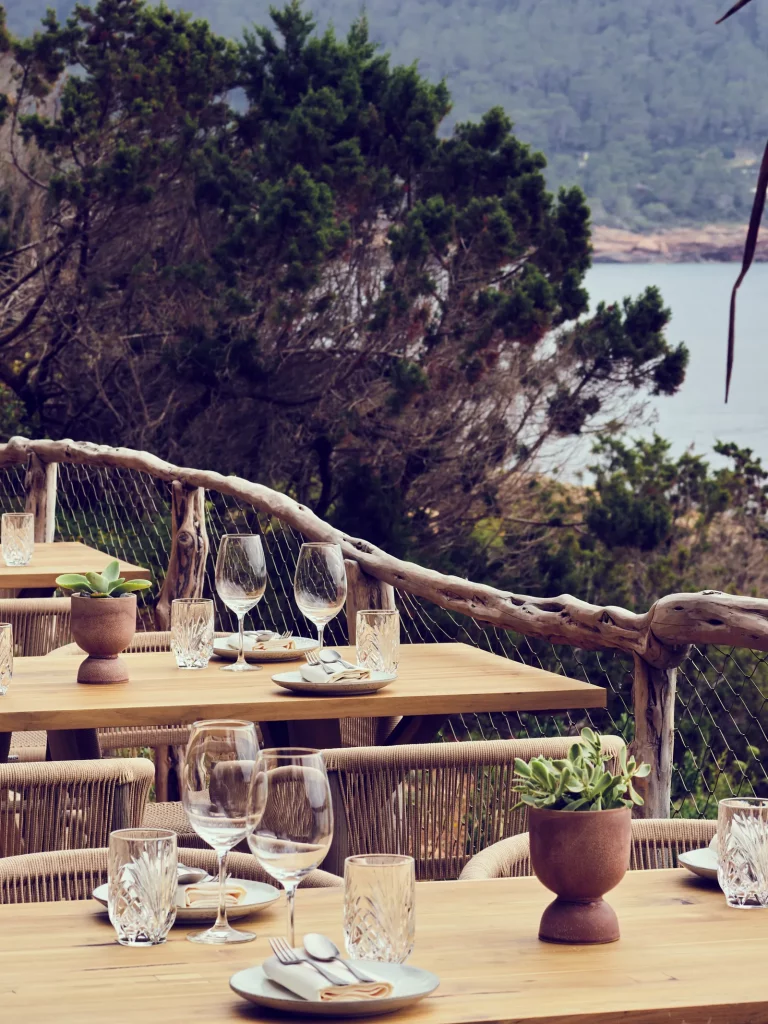
Six Senses opened Beach Caves in 2022 — an extension of the Cala Xarraca property. “The Beach Caves is like no other destination in Ibiza,” manager Ben Pundole told Travel + Leisure. “It’s elegant but approachable, fun yet eclectic, and — most importantly — unapologetically Ibizan.”
The property highlights local artists, cuisine, and culture. It’s also aiming to keep the nightlife Ibiza is known for intact, but with a refocus. The Xarraca Room offers cultural programming with a focus on art and music. It also includes a state-of-the-art recording studio for invited guests of the artists-in-residence program.
Beach Caves is also pushing forward Ibiza’s sustainability commitments by eschewing single-use plastic and sourcing locally, among other efforts. It’s also donating a portion of revenue to organizations including the Lonely Whale Foundation and Project Zero, and community programs like the Happy Hippie Cat sanctuary.
“The Beach Caves is a welcome addition to Six Senses Ibiza, and marks the beginning of an exciting new chapter for the brand. It reflects the history, excitement, and eclectic spirit of the Island,” says Pundole.
“Through its unique design and extensive programming, we aim to create an incredible destination for both hotel guests and the local community to eat, drink, dance, shop, and sleep. The cultural program will include art, music, and live performances, as well as a focus on environmental and community initiatives.”
Ready for a destination vacation? Be sure to check our list of beachfront and nature-immersed hotels as well as our guide to Mallorca, Spain.
Related on Ethos:

